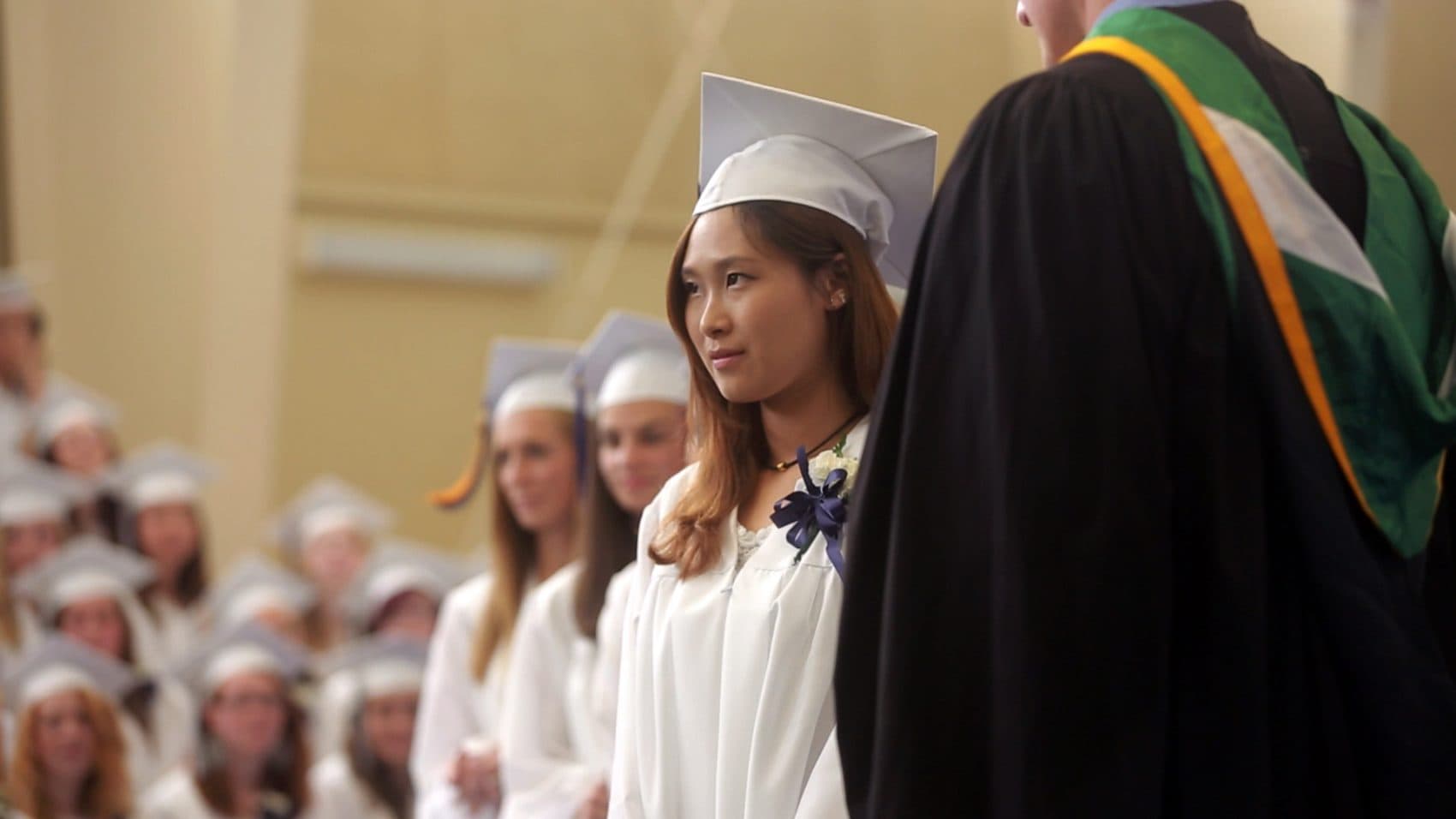Advertisement
'Maineland' Follows Chinese Teenagers Chasing American High School Dream

What's it like for Chinese students to come study in America?
That's the subject of "Maineland," a new documentary that follows two students as they leave homes and families behind to go to high school in rural Maine. The film, which is in both English and Mandarin, won a Special Jury Award at South By Southwest last year.
Miao Wang, its director, producer and co-editor, says she felt it was a story "that had to be told."
"I grew up in China, and I moved when I was 12, and I actually moved to Boston and studied in high school there, and college, and now I've been here for many years," she tells Here & Now's Jeremy Hobson. "So I was very familiar with this experience of arriving as a teenager and being thrown into a high school that's completely different from what I'm familiar with."
Interview Highlights
On how common it is for Chinese students to study in the U.S.
"Well, it was not at all common when I came. But now, in the last 10 years it's been a rising phenomenon. And in the last five years it's exponentially ... every year, more and more students are coming here. And I think this year, or last year, there was over 300 Chinese students studying in the U.S. Over a third of the international students studying in the U.S. are Chinese."
On Fryeburg Academy, the school at the center of the documentary
"The school kind of landed a little bit in my lap, because I was invited to do a screening in that school for my previous film. And when I arrived, I just felt like this was kind of perfect. There were all these Chinese students there, it was in the middle of nowhere in Maine, and the contrast, visual contrast, immediately came to my mind of, you know, a big metropolis in China versus this quiet town in Maine. So when I talked to the admissions director I just said, 'Well, maybe I can follow you on your next trip to China.' And he goes to China twice a year. So I followed him, and that's how the journey began."
On reasons why Chinese students want to come to America for school
"Well there were several reasons, and one major one is the gaokao, which is the Chinese college entrance exam, and it's a gate of passage that every single Chinese child has to go through in order to get to college. So that is so difficult that every year there are more and more people not taking that. And one of the reasons for a lot of the students who wanna come study abroad is also just to escape from that exam. And the other reason is, a lot of Chinese parents now really want their kids to have an international perspective, because they are seeing China as having a role in the world, and they want their kids to be able to work and collaborate with others in this more global village. And another reason is parents are concerned with their kids living in tiny cities that are full of pollution, and they kinda want to get their children out of those cities that [don't] have good water and air. So yeah, many different reasons, and the educational system, a lot of Chinese parents are concerned with the educational system. They feel like it's a bit stifling towards at least some of the kids, and they want them to come to learn critical thinking, creative thinking and to be able to succeed in a much more different world."
Advertisement

On Harry, one of the Chinese students the film follows
"When I first met him at this interview, he just had these really interesting, I thought, very thoughtful things to say. He talked about his dad, and how much he respected his dad. Then he talked about also just how much he wanted to come to the U.S., because you want to know what critical thinking is. So those immediately grabbed my attention, and I felt like even though he seemed like, on the surface, any normal Chinese boy who seems kind of quiet, introverted and plays a lot of video games, I felt like there was something more to him, and he had this kinda philosophical touch about him. And I was really shocked when he told me that he actually picked that topic himself. I thought maybe they were just doing it because it was a global studies class, and I thought, you know, maybe the teacher provided that as an assignment. But yeah, he just kind of matter-of-factly said, 'Well, I was very curious, because it's something you don't really get to know anything about in China.' "
On whether many Chinese students who come to the U.S. for school wind up in high-paying fields
"Yeah absolutely. But also, yeah I do think that also it's all the time changing. I feel like when I came here, that was probably even a bigger pressure. And, you know, I'm seeing many more students who are actually studying the arts coming here. So that is changing quite a bit. But most of the Chinese students you see who are applying to the U.S. for school are applying to study economics, business, finance, you know, technology, because those are the more practical fields."

On which is a bigger culture shock: a Chinese student studying in the U.S., or an American student studying in China
"That's a good question. Maybe, in some ways, maybe for Americans to go study in China, actually. Just because I think the Chinese know so much about ... well, they're so curious about America all the time, and they're always, you know, watching all the American TV, watching everything, they consume everything they can about America, and they're fascinated. And I think when you're in China, you hear about news from the world all the time. But I do feel like, in America, there's a little bit of a ... maybe people are not as aware of what China is actually like. So, because of that, maybe there could be even more of a shock. And also, in China they're teaching English in Chinese schools in the first grade. And I know some of that is starting in the U.S. — now there are communities that are starting to teach Chinese for grade-school students. But I would say the majority of Americans still are not gonna be likely to speak any Chinese, and most Chinese, meanwhile, have at least some level of English at this point."
This article was originally published on March 15, 2018.
This segment aired on March 15, 2018.